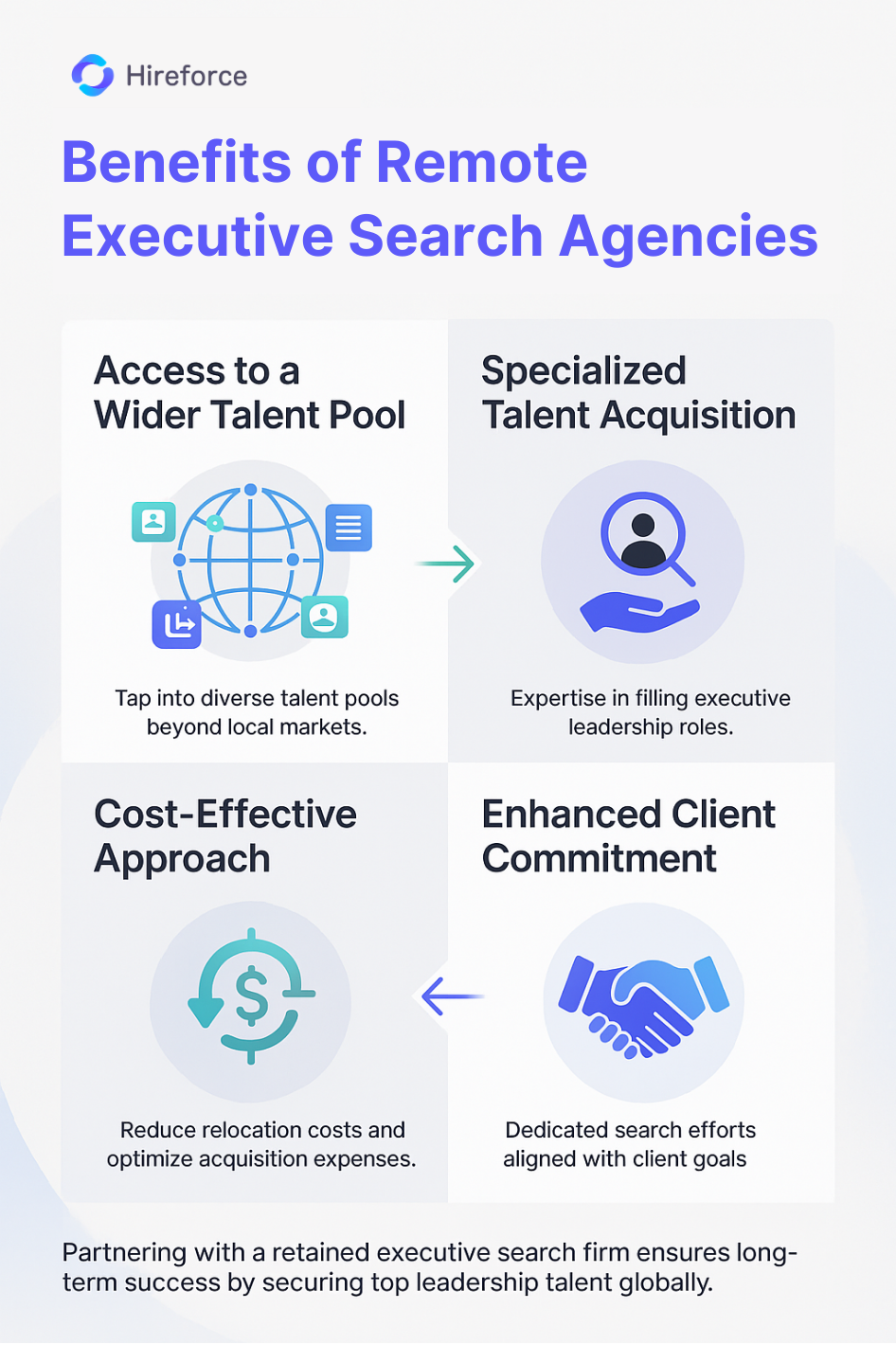Introduction to Executive Search Firm
Navigating the landscapes of executive search agencies can be quite complex for HR managers and talent acquisition leaders dedicated to attracting exceptional executive talent. However, mastering this landscape is crucial for success in securing top-tier leadership. Retained executive search has evolved, with remote and hybrid work becoming standard, presenting unique opportunities and challenges.
Understanding Remote Executive Search
Remote executive search firms specialize in proactively identifying and recruiting candidates for senior-level positions, including CEOs, CFOs, and other C-suite roles. Unlike contingent recruiting, retained executive firms offer dedicated resources, comprehensive searches, and tailored strategies designed specifically for clients' needs.
The rise of remote and hybrid working models has transformed executive search across geographical boundaries, allowing retained executive search firms to leverage a broader talent pool. Organizations can now partner with specialized teams to identify executives uniquely suited for remote leadership positions, enhancing executive leadership capabilities without geographical constraints
Benefits of Remote Executive Search Agencies
As remote work transforms the global labor landscape, organizations' ability to effectively manage dispersed skill sets has never been more critical for maintaining a competitive edge. Operating within this new paradigm, remote executive search agencies offer distinct advantages, notably by significantly lowering the resource investment traditionally required to identify and secure candidates for specialized, hard-to-fill leadership roles, regardless of geographic constraints.
Crucially, their approach facilitates proactive workforce planning, enabling companies to strategically anticipate needs and cultivate a readily available, pre-vetted talent pool that ensures seamless succession and sustained leadership for vital positions in an increasingly dynamic market.
- Access to a Wider Talent Pool: Retained executive search agencies tap into extensive global networks, enabling executive search across diverse talent pools beyond local markets.
- Specialized Talent Acquisition: These firms specialize in executive leadership roles, ensuring clients receive highly targeted, strategic talent solutions.
- Cost-Effective Approach: Retained executive search reduces relocation costs and optimizes overall talent acquisition expenses by avoiding geographic limitations.
- Enhanced Client Commitment: Retained firms provide dedicated search efforts and strategic advisory, ensuring alignment with the client’s long-term goals and organizational culture.

Choosing the Right Executive Search Agency
Selecting the right executive search agency is critical to your recruitment success. Consider the following factors:
Reputation and Track Record
Research potential agencies thoroughly. Look for firms with a proven track record of successful placements in your industry. Check client testimonials and case studies to gauge their expertise and reliability.
Specialization
Some agencies specialize in specific industries or roles. Ensure the agency you choose has experience and knowledge in your sector, whether it's technology, finance, or healthcare. This specialization can lead to a more tailored and effective search process for finding the right leader for your organization.
Network and Reach
Evaluate the agency's network and reach. Leading recruiters and top executive recruiting firms often have extensive connections, allowing them to access passive candidates who are not actively seeking new opportunities but may be open to a change.
Technological Capabilities
Technological capabilities are crucial in the digital age. Top technology executive recruiters leverage advanced tools like AI and data analytics to enhance their search process. Ensure the agency you select utilizes cutting-edge technology to identify and assess candidates efficiently.
Key Challenges and Solutions
Remote executive search comes with its own set of challenges. Here are some common hurdles and how to overcome them:
Maintaining Cultural Fit
Hiring for cultural fit is critical, especially for executive roles. Remote agencies can struggle to assess this aspect due to the lack of face-to-face interactions. To address this, ensure the agency conducts comprehensive interviews and utilizes personality assessments to evaluate candidates' alignment with your company culture.
Communication Barriers
Effective communication is vital throughout the recruitment process. Remote setups can lead to misunderstandings and delays. Choose an agency emphasizing clear and consistent communication, employing video calls, regular updates, and collaborative tools to keep all parties aligned.
Ensuring Diversity and Inclusion
Diversity and inclusion are essential for fostering innovation and growth. However, remote searches may inadvertently narrow the candidate pool. To counteract this, partner with agencies prioritizing diversity in their recruitment strategies and have a track record of placing diverse candidates in executive roles.
Best Practices for Engaging with Remote Executive Search Agencies

To maximize the effectiveness of your partnership with remote executive search agencies, consider these best practices:
Clearly Define Your Needs
Before engaging an agency, clearly outline the qualifications, experience, and characteristics you seek in a candidate. Provide a detailed job description and highlight key attributes that align with your company's values and goals.
Set Realistic Expectations
Understand that finding the right executive can take time. Set realistic timelines and expectations with the agency. Rushing the process may lead to suboptimal hires.
Maintain Open Communication
Establish open lines of communication with the agency. Regularly share feedback on candidate profiles and interviews, and be receptive to their insights and recommendations.
Foster Collaboration
Treat the agency as an extension of your HR team. Involve them in strategic discussions and provide them with relevant company information. The more they understand your organization's culture and goals, the better they can tailor their search efforts.
Forecasting Future Trends in Executive Search
As the recruitment landscape continues to evolve, HR managers and talent officers must stay ahead of future trends. This requires a proactive approach to understanding the shifting dynamics of the workforce, including integrating advanced technologies, changing employee expectations, and the impact of globalization on talent acquisition.
Increased Use of AI and Data Analytics
AI and data analytics are poised to play a significant role in executive search. These technologies can streamline candidate sourcing, assess skills, and predict candidate success, making the recruitment process more efficient and effective.
Emphasis on Soft Skills
While technical skills remain important, there is a growing emphasis on soft skills such as leadership, adaptability, and emotional intelligence. Future executive searches will likely focus more on assessing these attributes to ensure candidates can navigate complex and dynamic environments.
Remote Work as a Standard
The shift towards remote work is likely here to stay. Executive search agencies will continue to adapt their strategies to identify leaders who can thrive in remote or hybrid work settings.
Focus on Diversity and Inclusion
Diversity and inclusion will remain a top priority. Agencies will increasingly develop strategies to identify diverse talent and ensure that executive teams reflect the communities they serve.
Conclusion
As competition in the labour market intensifies, it is important to effectively recruit the right executives for your business through remote executive search firms. By understanding the benefits, challenges, and best practices outlined in this article, HR and talent managers can enhance their recruiting strategies and position their organizations for success. Seize the opportunities that remote executive search presents and partner with companies that align with your company’s values and goals to build a leadership team that drives growth and innovation.




